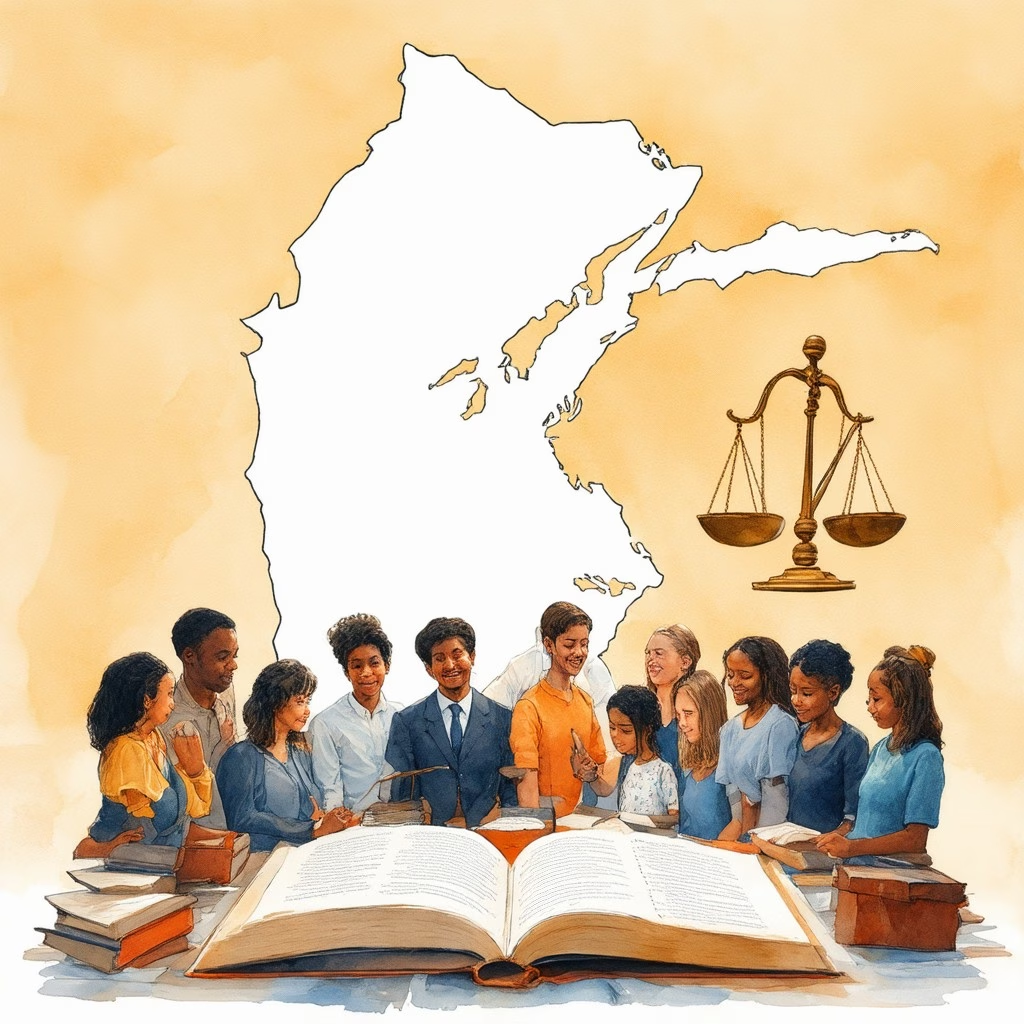Key Takeaways
- Legal Aid Representation: Access essential legal aid services in Massachusetts for free or low-cost representation in critical areas like family law and housing disputes.
- Income Eligibility: Most legal aid organizations assist individuals with incomes at or below 125% of the federal poverty line, approximately $17,000 for individuals.
- Free Legal Advice: Utilize 24/7 hotlines for immediate guidance on legal aid services, eligibility, and costs associated with obtaining legal representation.
- Collaborative Support: Legal aid representatives work with community organizations to provide holistic support, addressing both legal and social needs of clients.
- Pathways to Assistance: Contact local legal aid organizations, explore online resources, and consider pro bono services from private attorneys for comprehensive legal support.
In today’s complex legal landscape, understanding legal aid representation is crucial for those seeking justice without the burden of high costs. This article will delve into the essential aspects of legal aid representation in Massachusetts, including the role of a legal aid representative, the cost structure of legal services, and the income eligibility criteria for accessing these vital resources. We will also explore how to obtain a free lawyer in Massachusetts, the services offered by legal aid lawyers, and the differences between legal aid and private legal services. Whether you are in need of legal assistance for divorce or simply looking for free legal advice, this comprehensive guide will provide you with the insights and resources necessary to navigate the legal system effectively. Join us as we uncover the pathways to accessing free lawyers for low-income families and the support available through legal aid services.
What is a legal aid representative?
A legal aid representative is a qualified attorney who provides free or low-cost legal assistance to individuals who cannot afford to hire a private lawyer. Legal aid representatives play a crucial role in ensuring access to justice for marginalized communities by offering support in various legal matters, including family law, housing disputes, immigration issues, and public benefits.
Understanding the Role of a Legal Aid Representative
Key functions of legal aid representatives include:
- Client Advocacy: They advocate for clients in legal matters, ensuring their rights are protected and their voices are heard, particularly in cases involving vulnerable populations.
- Litigation: Legal aid representatives may represent clients in court, handling cases that range from simple disputes to complex litigation. They often work to challenge unjust laws and practices that disproportionately affect low-income individuals.
- Systemic Change: Beyond individual cases, legal aid representatives may engage in broader advocacy efforts aimed at systemic reform, addressing issues that impact large groups of people facing similar legal challenges.
- Legal Education: They provide essential legal education and resources to clients, helping them understand their rights and the legal processes involved in their cases.
- Collaboration with Community Organizations: Legal aid representatives often collaborate with non-profit organizations, social services, and community groups to provide holistic support to clients, addressing both legal and social needs.
Legal aid services are typically funded by government programs, private donations, and grants, ensuring that legal assistance remains accessible to those in need. For more information on legal aid resources, individuals can visit the Legal Services Corporation (LSC) website or consult local legal aid organizations.
Importance of Legal Aid Representation in Massachusetts
Legal aid representation is vital in Massachusetts, where many individuals face significant legal challenges without the means to hire private attorneys. The availability of legal aid lawyers ensures that low-income families receive the necessary support in critical areas such as housing, family law, and public benefits. This representation not only helps individuals navigate complex legal systems but also promotes fairness and equity within the community.
Moreover, legal aid services contribute to the overall well-being of society by addressing systemic issues that affect marginalized groups. By providing access to justice, legal aid representatives help empower individuals to advocate for their rights and improve their circumstances, ultimately fostering a more just and equitable society.

How much does a legal aid lawyer cost?
Understanding the cost structure of legal aid services is crucial for individuals seeking legal assistance. Legal aid lawyers typically provide their services at no cost to individuals who meet specific income eligibility criteria. These not-for-profit organizations aim to assist those who cannot afford traditional legal representation. While many legal aid offices primarily serve individuals with very low incomes, some may have more flexible income guidelines, allowing a broader range of clients to access their services.
Cost Structure of Legal Aid Services
Legal aid representation is designed to be accessible, meaning that most services are offered free of charge. In addition to free legal representation, many legal aid offices offer self-help resources, including legal forms, guides, and workshops, which can empower individuals to navigate legal processes independently. These resources are particularly valuable for those who may not qualify for full legal representation but still require guidance.
For more comprehensive legal assistance, some low-cost legal services may be available through pro bono programs or sliding scale fees, where the cost of legal services is adjusted based on the client’s income. It’s essential to research local legal aid offices or community organizations that may provide these services. For further information on legal aid resources, you can visit Legal Services Corporation, which connects individuals with local legal aid offices and resources tailored to their needs.
Free Legal Advice Hotline 24/7 for Cost Inquiries
If you have questions about the costs associated with legal aid services, a free legal advice hotline is available 24/7 to assist you. This hotline can provide immediate answers regarding eligibility, available services, and any potential costs involved. Utilizing this resource can help clarify your options and guide you toward the appropriate legal aid representation.
For those seeking legal assistance, remember that many organizations offer free consultations, allowing you to discuss your case without financial commitment. Whether you need help with family law, housing disputes, or other legal matters, reaching out to a legal aid lawyer can be a vital step in securing the support you need.
What is the maximum income to qualify for legal aid?
Understanding the income eligibility criteria for legal aid representation is crucial for those seeking assistance. Legal aid programs are designed to help individuals who cannot afford legal services, and income thresholds play a significant role in determining eligibility. Here are the key points regarding maximum income limits for legal aid eligibility:
- 125% of Federal Poverty Guidelines: This is the most common threshold used by legal aid organizations funded by the Legal Services Corporation (LSC). For example, in 2023, this equates to an annual income of approximately $17,000 for an individual and $35,000 for a family of four.
- 200% of Federal Poverty Guidelines: Some legal aid organizations may have more flexible income criteria, allowing individuals and families with incomes up to 200% of the FPG to qualify for assistance. This translates to about $27,000 for individuals and $55,000 for a family of four in 2023.
- Variable Income Limits: Specific income limits can differ based on the particular legal aid organization and the type of legal case. Certain organizations may consider additional factors such as expenses, family size, and the nature of the legal issue.
For the most accurate and updated information, individuals seeking legal aid should consult the specific legal aid organization in their area or visit resources like the Legal Services Corporation website. Additionally, tools like Gov Guider can provide guidance on eligibility and available services based on individual circumstances.
Resources for Checking Eligibility: Legal Aid Society
Finding the right resources to check eligibility for legal aid representation is essential for those in need. The Legal Services Corporation and local legal aid societies provide comprehensive information on income limits and application processes. Here are some valuable resources:
- Local Legal Aid Societies: Many states have local legal aid societies that offer tailored assistance and can help determine eligibility based on specific circumstances.
- Online Eligibility Tools: Websites like Legal Services Corporation often feature online tools that allow users to input their income and family size to see if they qualify for legal aid.
- Free Legal Advice Hotline 24/7: Many organizations offer a free legal advice hotline 24/7 where individuals can call to inquire about eligibility and receive immediate assistance.
Utilizing these resources can significantly streamline the process of accessing legal aid services and ensure that individuals receive the help they need in a timely manner.
How do I get a free lawyer in Massachusetts?
Accessing free legal services in Massachusetts is a vital step for those in need of legal aid representation. To obtain free legal assistance, you can explore several options through civil legal aid organizations. Eligibility for these services typically depends on your income level, which must be at or below 125% of the federal poverty line. As of 2025, this means an annual income of approximately $40,187 for a family of four and $19,562 for an individual.
Steps to Access Free Legal Services in Massachusetts
- Contact Legal Aid Organizations: Reach out to organizations such as Greater Boston Legal Services, Massachusetts Legal Assistance Corporation, or South Coastal Counties Legal Services. These organizations provide free legal services to eligible individuals.
- Check Eligibility: Each organization has specific eligibility criteria based on income and the type of legal issue. Be prepared to provide documentation of your income and any relevant case details.
- Utilize Online Resources: Websites like MassLegalHelp.org offer valuable information on legal rights and resources available in Massachusetts. They can guide you through the process of finding assistance.
- Seek Pro Bono Services: Many private attorneys in Massachusetts offer pro bono services for individuals who cannot afford legal representation. The Massachusetts Bar Association can help connect you with these attorneys.
- Visit Local Law Schools: Law schools in Massachusetts often have legal clinics where law students provide free legal assistance under the supervision of licensed attorneys. This can be a great resource for basic legal issues.
Finding Free Lawyers for Low-Income Families Near Me
For low-income families seeking legal aid, finding a free lawyer can be crucial. Start by searching for local legal aid offices that specialize in your specific legal needs, such as family law or housing issues. You can also consider the following resources:
- Local Legal Aid Offices: Many cities have legal aid offices that cater specifically to low-income families. These offices can provide tailored assistance based on your situation.
- Community Organizations: Nonprofits and community organizations often partner with legal aid services to offer free consultations and legal representation.
- Online Directories: Utilize online directories that list free legal services in your area. Websites like Legal Services Corporation can help you find resources near you.
- Referral Services: The Massachusetts Bar Association offers a lawyer referral service that can connect you with attorneys who provide free consultations.
By following these steps and utilizing available resources, you can effectively navigate the process of obtaining legal aid representation in Massachusetts.

What Can a Legal Representative Do?
A legal representative plays a crucial role in the legal system, providing essential services to clients in various contexts. Here are the key functions and responsibilities of a legal representative:
- Court Representation: A legal representative, often an attorney or lawyer, defends their client during court proceedings. This includes presenting evidence, making legal arguments, and cross-examining witnesses to advocate for the client’s interests.
- Legal Advice: They offer expert legal advice to clients, helping them understand their rights and obligations under the law. This guidance is vital for making informed decisions throughout the legal process.
- Document Preparation: Legal representatives prepare and file necessary legal documents, such as contracts, pleadings, and motions, ensuring compliance with legal standards and deadlines.
- Negotiation: They negotiate settlements on behalf of their clients, aiming to resolve disputes amicably without the need for a trial. Effective negotiation can lead to favorable outcomes and save time and resources.
- Research and Investigation: Legal representatives conduct thorough research and investigations to gather facts and evidence that support their client’s case. This may involve reviewing case law, statutes, and legal precedents.
- Client Advocacy: Beyond the courtroom, they advocate for their clients’ interests in various settings, including administrative hearings and mediation sessions.
- Confidentiality and Ethics: Legal representatives are bound by strict ethical guidelines and confidentiality rules, ensuring that client information is protected and that they act in the best interest of their clients.
For more detailed information on the roles and responsibilities of legal representatives, you can refer to resources such as the American Bar Association and legal textbooks that outline the legal profession’s standards and practices.
Services Offered by Legal Aid Lawyers
Legal aid lawyers provide a range of services aimed at assisting low-income individuals and families. These services include:
- Family Law Assistance: Legal aid lawyers offer legal assistance for divorce and other family matters, ensuring that clients understand their rights and options during emotionally challenging times.
- Housing and Eviction Defense: They help clients navigate housing issues, including eviction defense, ensuring that tenants are protected under the law.
- Consumer Protection: Legal aid lawyers assist clients facing consumer issues, such as debt collection and unfair business practices.
- Public Benefits: They provide guidance on accessing public benefits, helping clients secure the support they need for basic living expenses.
For those seeking a free lawyer consultation, legal aid services are a vital resource. These services ensure that everyone, regardless of income, has access to necessary legal support.
Is Legal Aid the Same as a Lawyer?
Legal aid and a lawyer are not the same, though they are related concepts in the legal system. Legal aid refers to free or low-cost legal assistance provided to individuals who cannot afford to hire a private attorney, particularly in civil matters. This service is crucial for ensuring access to justice for low-income individuals and families. Legal aid lawyers are specifically trained to handle cases involving housing, family law, immigration, and public benefits, making them essential for those in need of legal representation.
Differences Between Legal Aid and Private Lawyers
The primary difference between legal aid and private lawyers lies in their funding and client base. Legal aid lawyers typically work for nonprofit organizations funded by government grants and donations, focusing on serving low-income clients. In contrast, private lawyers operate as independent businesses, charging fees based on their services. This distinction means that legal aid representation is often available to those who cannot afford the high costs associated with hiring a private attorney.
Additionally, legal aid services may have limitations on the types of cases they can take on, often prioritizing urgent legal issues such as domestic violence, eviction, or child custody. Private lawyers, however, can choose to represent clients in a broader range of cases, including those that may not qualify for legal aid assistance.
Understanding the Scope of Legal Services Aid
Legal services aid encompasses a variety of support options available to individuals facing legal challenges. These services include:
- Pro bono services: Many private attorneys offer pro bono work, providing free legal representation to those in need.
- Legal aid organizations: Nonprofit entities that provide legal assistance to eligible individuals, often focusing on specific areas of law.
- Law school clinics: Law students, supervised by licensed attorneys, offer legal services to the community, helping to bridge the gap for those seeking assistance.
To access these services, individuals typically need to meet certain income eligibility requirements and demonstrate the nature of their legal issue. For more information on how to get a legal aid lawyer, you can refer to this guide.
Understanding the differences between legal aid and private lawyers is essential for individuals seeking legal assistance. By recognizing the resources available, such as Legal Services Corporation and local legal aid organizations, individuals can better navigate their legal challenges and secure the help they need.
Legal Aid Resources and Support
Accessing legal aid representation is crucial for individuals facing legal challenges, especially for those with limited financial resources. Understanding where to find these resources can significantly impact your ability to secure the legal assistance you need. Below, we explore how to locate legal aid services and provide an overview of notable organizations that offer support.
Finding Legal Aid Near Me: Local Resources and Organizations
To find legal aid near you, start by searching for local legal aid organizations that provide free or low-cost legal services. Many states have dedicated legal aid offices that cater to low-income individuals and families. For example, the Legal Services Corporation offers a directory of legal aid programs across the United States, making it easier to locate assistance in your area. Additionally, local bar associations often have referral services that can connect you with legal aid lawyers.
In Massachusetts, organizations like Mass Legal Help provide comprehensive resources for individuals seeking legal aid representation. They offer information on various legal issues, including housing, family law, and public benefits. Utilizing these resources can help you navigate the complexities of legal aid services effectively.
Overview of Legal Services NYC and New York State Legal Aid
In New York, the landscape of legal aid is robust, with numerous organizations dedicated to providing legal assistance to those in need. Legal Services NYC is one of the largest providers of free civil legal services in the city, focusing on issues such as housing, family law, and immigration. They offer a variety of programs, including a free lawyer consultation service that can guide individuals through their legal challenges.
Moreover, the New York State Legal Aid provides essential support for low-income families, ensuring that everyone has access to legal representation regardless of their financial situation. Their services include legal assistance for divorce and other family matters, helping individuals navigate complex legal processes with confidence.
By leveraging these resources, individuals can find the legal aid representation they need to address their legal issues effectively. Remember, accessing a legal aid lawyer can be a vital step toward achieving justice and resolving legal disputes.




